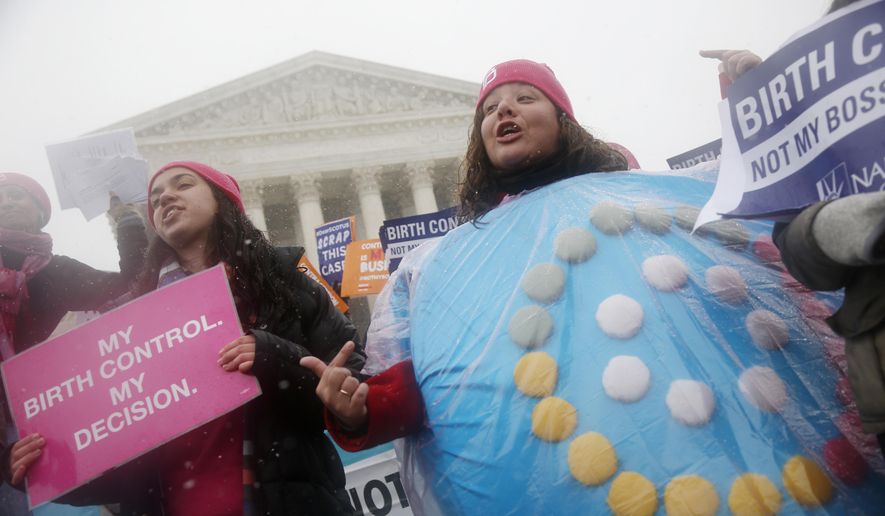The Obama administration on Friday tried to extinguish lingering concerns about Obamacare’s birth-control mandate, issuing final rules on how closely held corporations and religious nonprofits can opt out.
Health and Human Services Department officials said it rewrote its rules after the Hobby Lobby crafts chain and other devout business owners successfully challenged the mandate before the Supreme Court last year.
They also tried to mollify religious nonprofits who say their plans are used an conduits for sinful activity.
“Women across the country should have access to preventive services, including contraception,”HHS secretary Sylvia M. Burwell said. “At the same time, we recognize the deeply held views on these issues, and we are committed to securing women’s access to important preventive services at no additional cost under the Affordable Care Act, while respecting religious beliefs.”
The contraception mandate requires employers to cover 20 types of FDA-approved drugs and services as part of their health plans, including morning-after pills that Catholic groups and others equate with abortion.
In a 5-4 decision, the Supreme Court held that closely held corporations do not have to insure forms of birth control they object to on moral grounds.
They pointed to a 1993 religious-freedom law that says the government must find the least restrictive means possible to achieve its aims — in this case, providing cost-free birth control through employer-sponsored health plans.
HHS said Friday it relied on federal tax law to define a closely held corporation has one that is not publicly traded. It also said more than half of the company’s ownership should rest with five or fewer people, with all members of a single family being treated as an individual.
A company that meets this definition can opt out by adopting a resolution and then notifying either HHS or their insurer or third-party administrator of their formal objections. The third-party entity would make sure that female employees get their contraceptives, at no cost to the employer or employee.
The American Civil Liberties Union praised the effect of HHS’s announcement, while maintaining it shouldn’t have been necessary.
“Today’s guidance is a positive development for women denied access to important healthcare in the troubling aftermath of the Hobby Lobby ruling,” said Brigitte Amiri, senior staff attorney for the ACLU’s Reproductive Freedom Project. “Invocations of religion shouldn’t be used as a smokescreen to allow employers to treat their female employees like second-class citizens. That’s why an accommodation was never necessary in the first place.”
The administration said it’s definition should cover all of the companies that challenged the mandate, but it faces longer odds among faith-based charities, hospitals and universities who want the type of blanket exemption that houses of worship enjoy.
HHS said Friday that religious nonprofits can opt out of the mandate by notifying HHS of their objections. Already, a nonprofit could have notified an insurer or third-party administrator that it doesn’t want any part in the coverage.
But nonprofits who’ve sued the administration have already rejected both options, and their backers showed no signs of backing off Friday.
“The government keeps digging the hole deeper,” said Adèle Auxier Keim, legal counsel at the Becket Fund for Religious Liberty, which pointed to several Supreme Court injunctions ordering lower courts to examine the nonprofits’ cases in line with the Hobby Lobby case.
Religious nonprofits say they are still complicit in providing drugs or services they object to, while the administration argues the nonprofits are like conscientious objectors at wartime who try to block the government from drafting someone else.
Nonprofits are now 0-5 in the federal circuit courts, depriving them of a coveted win that could force a showdown before the same Supreme Court that sided with family-owned corporations in “Hobby Lobby.”
Appellate judges have said that ruling is of little help to the nonprofits. At the time, the corporate objectors didn’t have the type of opt-out route that administration officials had extended to religious nonprofits.
• Tom Howell Jr. can be reached at thowell@washingtontimes.com.




Please read our comment policy before commenting.